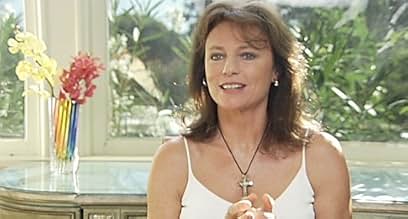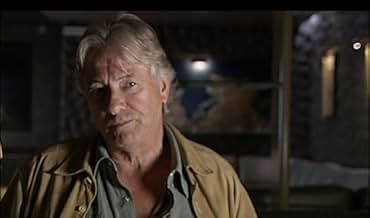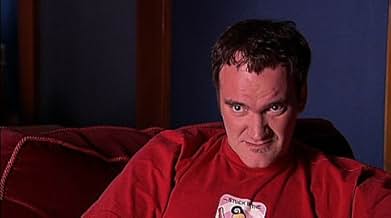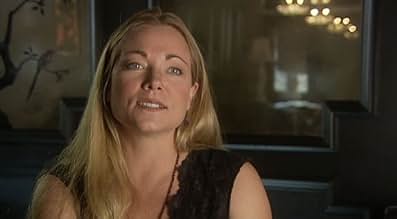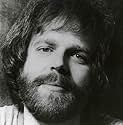Aggiungi una trama nella tua linguaThe story of Z Channel, one of the first U.S. pay cable stations and its programming chief, Jerry Harvey. Debuting in 1974 in LA, their eclectic slate of movies became a prime example of the... Leggi tuttoThe story of Z Channel, one of the first U.S. pay cable stations and its programming chief, Jerry Harvey. Debuting in 1974 in LA, their eclectic slate of movies became a prime example of the untapped power of cable television.The story of Z Channel, one of the first U.S. pay cable stations and its programming chief, Jerry Harvey. Debuting in 1974 in LA, their eclectic slate of movies became a prime example of the untapped power of cable television.
- Premi
- 1 vittoria e 1 candidatura in totale
- Self - Program Director, Z Channel
- (filmato d'archivio)
Recensioni in evidenza
Jerry Harvey was a college dropout who intensely loved film and film studies, making him the ideal choice for deciding what films would appear on Z Channel. Various former co-workers, critics, directors and actors, mostly independents, offer their fond memories of a channel that had the power to make or break a film or filmmaker. (Cassavetes includes a story about how one of Hollywood's most infamous film debacles, "Heaven's Gate" ended up being ridiculed because of terrible editing; when Z Channel ran the director's cut it was heralded by the public and critics alike.) The vision that Harvey had for the channel and the output it had is envious even by today's standards. They would have Bergman film festivals, uncut versions of films that had only been seen in their edited format, cult and avant garde films; and directors like Alexander Payne (sporting an old Z Channel t-shirt) and Quentin Tarantino share their memories of having tapes of old Z channel broadcasts.
Unfortunately, personal demons and a family history of psychological issues ended Jerry Harvey's life and the life of his wife when he first killed her then killed himself. This was shortly after the eventual demise of the Z channel itself, which first sold out and shared programming with ESPN, and then was dissolved altogether. Despite its unceremonious demise, Z channel is remembered fondly by those that experienced its programming and were involved in its broadcasting, and is looked upon with reverence by anyone who considers themselves, like Jerry Harvey, a life-long student of film. This is an excellent documentary and really is a must-see for film buffs. 8/10 --Shelly
It's that kind of worship that obviously inspired Directer Xan Cassavetes to make "Z CHANNEL - A Magnificent Obsession". And, through the dozens of interviews included in the film, you can see how a relatively small local cable outlet (it never even reached 100,000 subscribers) could still burn in the memory 15 years after its untimely and much lamented demise. But, the film is also bittersweet, because the main creative force behind the channel during it's 80's heydey, Jerry Harvey, was a hugely tormented man whose own murder-suicide closely paralleled the channel's rapid demise.
As a documentary, Z CHANNEL, is somewhat lacking. I find it daunting to imagine very many viewers who didn't subscribe to the channel to either enjoy the movie, or even figure out exactly why it was made. Even a hardcore partisan like myself found it somewhat lacking in context or in giving a clear, lucid description of exactly WHAT Z CHANNEL was or what they showed. Yes, there are some wonderful interviews with Robert Altman, Vilmos Zsigmond and Quentin Tarantino (who, ironically, lived OUTSIDE its subscription area and could only experience it vicariously through a friend's VHS dubs!) as well as some scattershot clips from various movies that were carried on the station. But, why, for instance, do we never get a sample listing of all the films that played during a particular week or a particular month? And, why do we NEVER see actual FOOTAGE from the channel? (The movie clips are Presented as FILM which is certainly aesthetically pleasing when viewed in a theater but not representative of how they were watched on early 80's TV's). Were there rights issues? Certainly, testimony from Tarantino, Alexander Payne and others proves that people have tapes where excerpts could have been culled from. I still have dozens of recordings if they need it for the DVD! Not even a still frame of the station logo? Odd.
What can't be denied is the passion for movies that breathes in every word that is spoken by the interviewees. Careers were made (James Woods, Theresa Russell) or re-discovered for a new generation (Richard Brooks, Sam Peckinpah) simply because of the fact that an inordinately large percentage of the Hollywood community was hooked up to Z CHANNEL (it even aired movies for Academy Awards Consideration long before screener tapes). Some of the same forces that began to coalesce to crush Z CHANNEL (HBO, Cable & Satellite growth, STUDIO mergers with multi-national corporations) are even more in effect now, so it's impossible to imagine such a network existing again.
Long live Z CHANNEL - at least in the memories of those who knew it.
Jerry Harvey was a film geek's film geek. He joined Z Channel in 1980 after programming films for a local art-house cinema. Under Harvey's direction, Z Channel really took off, competing against heavyweights like HBO. While remaining a local treasure, Z Channel's influence was disproportionate to its subscriber base, since so many filmmakers lived in the LA area. Harvey was a friend and champion of such filmmakers as Sam Peckinpah, Henry Jaglom, Michael Cimino, Robert Altman, and Paul Verhoeven, and was one of the first to show "director's cuts" of such misunderstood films as Heaven's Gate, Once Upon A Time In America, and The Wild Bunch. But he was also a deeply troubled man. His obsessive nature fuelled his work, but it often led to bouts of crushing depression. His mood swings culminated in a terrible tragedy in 1988 when he killed his wife and then took his own life. Remembrances from his friends are still fraught with grief and anger, more than fifteen years later.
While at first, I wondered if I were seeing two films (a portrait of Jerry Harvey, and an appreciation of overlooked films), I realized that the beauty of Cassavetes' film is that she's celebrating the life and achievements of Jerry Harvey by talking about some of the films that he brought to her attention through Z Channel. Not his tragic end, but what came before. So often, when a life ends in tragedy or violence, we only remember that part. Sure, you could call Harvey a murderer. But he was also an incredible film lover and filmmaker's advocate, someone who had a wide ranging influence as well as a group of loyal friends who are still reeling from his loss.
Z Channel only lasted about a year after Harvey's death, and the many people interviewed (Quentin Tarantino, James Woods, Theresa Russell, Paul Verhoeven, Robert Altman, and Jacqueline Bisset among them) seem almost as wistful about the death of a certain era in cable television as of their friend Jerry Harvey.
P.S. It seems fitting that I should end my 2004 Toronto International Film Festival experience with a film about a TV channel that director Henry Jaglom described as "like a film festival in your house every night."
For those of you reading this who are not from Los Angeles or are not yet 30, you do not know what you missed. Imagine a late 60's, early 70's FM eclectic station that mixed Marvin Gaye, Frank Zappa, Charlie Parker, Parisian Ballads, The Rolling Stones and Parliment Funkadelic into their play list. Now, imagine the same kind of eclectic mix applied to movies. Oh yeah, add to that some late night Euro soft-core sex movies and a monthly magazine that provided the kind of insight you now find on IMDb with full cast lists and turkey alerts, 20 years before the internet.
The Z Channel got behind previously unheralded directors, actors and screenwriters and presented them to Hollywood power brokers in their Hollywood Hills living rooms. As much as any other factor, Z is responsible for the development of independent cinema in the USA. I know, I know, the Sundance festival is where it broke out. However, the Z Channel took the Raging Bulls of New York and Hollywood, mixed them with the best of world cinema, and presented them all in a single place where all the people responsible for making movies could watch them. Often times before or during their theatrical run! The imaginations ignited.
Nowadays, you have the segregation of radio and movies into distinct market niches (HBO = top 40; Black Starz = R&B; IFC = Alt rock; etc.) Z Channel broke the mold because the rules weren't in place. The credit for this diversity hangs on a cinephile programmer named Jerry Harvey.
And therein lies the tragedy. Much like an artist who borders on madness, Mr. Harvey's demons were almost always with him. The only escape he seemed to find was in a screening room and obsessively chasing down obscure, forgotten, interesting films. He must have been quite a character. Even the people who felt his wrath stand up for him in this film and accept his cruelness for what it was; a mental illness.
That is a long way to get around to an opinion but here goes:
The interviews are great. The film clips are terrific. The story is worth telling to a wider audience. (Though, as much as I would like to believe there is a theatrical market for this film, its subject may be too narrow.)
However, the film is not completely successful merging the parallel stories presented. The first story is the rise and eventual collapse of Z Channel itself. The second is the life of Mr. Harvey and his eventual crimes. The documentary drops hints that the fall of Z Channel parallels the demise of Mr. Harvey. The financial machinations that went on in the boardroom (five owners in ten years) probably had more to do with it than is presented. I suppose it is too much to ask that back room financing be presented as an interesting story arc but there you are.
Overall, the documentary works. The story presented is not one where all the pieces fall into place like a script. Instead it is a Hollywood tragedy played played out with all the blemishes. If it comes your way, do yourself a favor and see what we have lost.
The station had among it's subscribers some of the biggest names in Hollywood. What I found fascinating about this film is the power a cable channel can have. For example James Woods credits his Oscar nomination to the Z Channel's constant playing of the little seen movie "Salvador" to the right people.
As a film geek I also enjoyed the generous amount of film clips by director Cassavetes. The film turned me on to movies like "Bad Timing" and "F is for Fake".
Lo sapevi?
- QuizThis film was made only after the financing for another film project, a fiction film, partially collapsed.
- Citazioni
Alexander Payne: You just never know when you're living in a golden age.
- ConnessioniFeatures Tuo per sempre (1927)
- Colonne sonoreWhat'll I Do
Performed by William Atherton
Written by Irving Berlin
Courtesy of Paramount Pictures Corporation and Williamson Music
I più visti
Dettagli
- Data di uscita
- Paese di origine
- Lingua
- Celebre anche come
- Канал Z. Великолепная одержимость
- Luoghi delle riprese
- Aziende produttrici
- Vedi altri crediti dell’azienda su IMDbPro
Contribuisci a questa pagina


